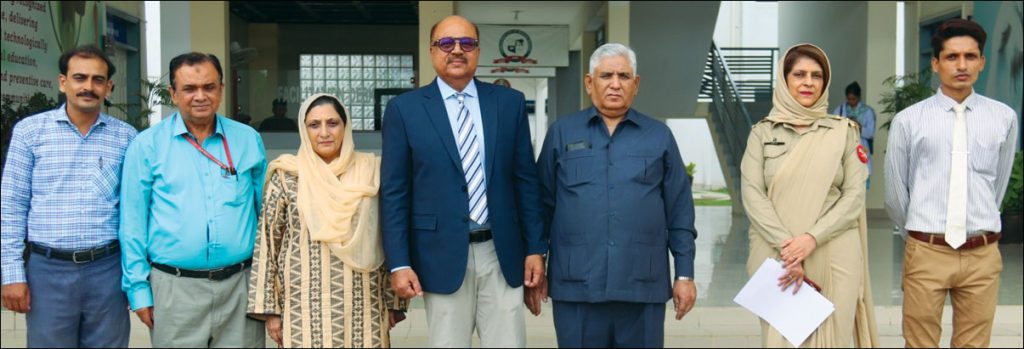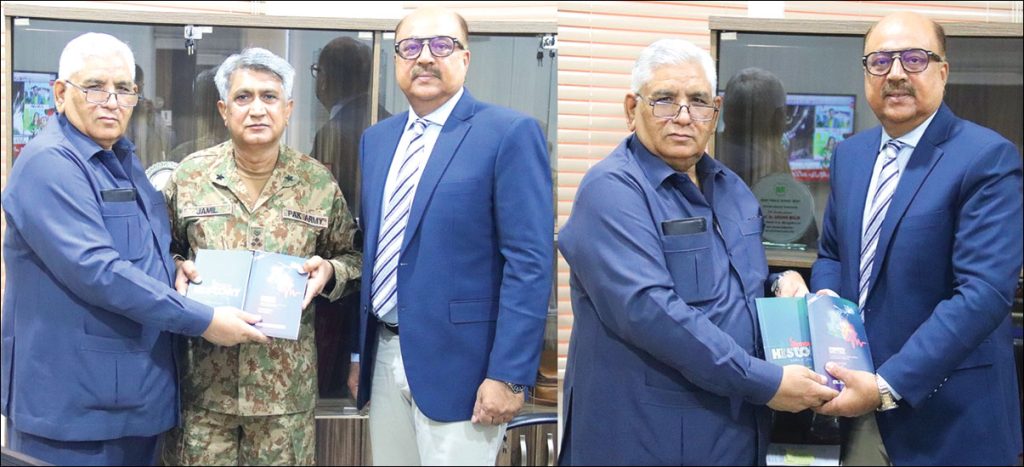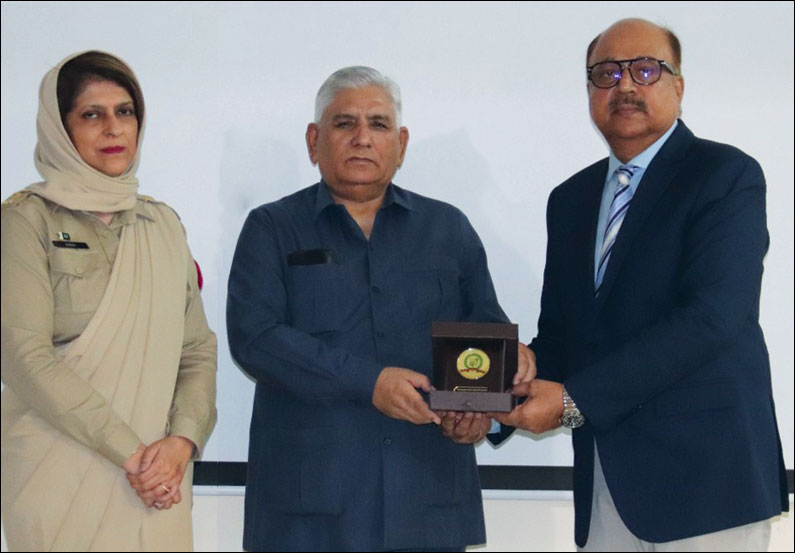Refrain from Gift authorship & be aware, practice publication ethics
Workshop on Scientific Writing at KIMS
KARACHI: The leadership and administration of Karachi Institute of Medical Sciences affiliated with National University of Medical Sciences, attached with Combined Military Hospital Malir Cantt is very keen to improve the professional capacity of its faculty and staff. Hence on an initiative taken by Prof. Seema Mumtaz and Prof. Arshad Malik Principal of KIMS, the Research and Development Department organized a workshop on Scientific Writing and Publications on August 9th 2024. Mr. Shaukat Ali Jawaid Chief Editor of Pakistan Journal of Medical Sciences and Secretary, Eastern Mediterranean Association of Medical Editors (EMAME) was the guest speaker. The participants included faculty of KIMS, doctors from Combined Military Hospital, postgraduates and medical students.

Group photograph taken after the workshop on August 9th shows Prof. Arshad Malik Principal KIMS, Prof. Seema Mumtaz, Mr. Shaukat Ali Jawaid Chief Editor PJMS alongwith some other faculty members from KIMS.
Mr. Shaukat Ali Jawaid in his presentation discussed the basic principles of medical writing, common reasons for rejection of manuscripts and emphasized that researchers should concentrate on originality, novelty, must be aware of research ethics and practice publication ethics. Gift authorship is a menace which is intellectual corruption which should never be encouraged and promoted.
Sharing details about pre-requisites before undertaking research, he stressed the importance of selecting a supervisor who has a good track record of mentoring the candidates. Seek the help of statistician before starting the data collection as they will help in selection of sample size, analysis and data interpretation. Topic should be selected carefully keeping in view the financial resources and making sure that one will get enough patients needed for the study during the specified period.

Mr. Shaukat Ali Jawaid Chief Editor Pakistan Journal of Medical Sciences presenting his books to Prof. Arshad Malik Principal KIMS and Brig. Jamil
on left during his visit to KIMS on August 9th 2024.
If one has conducted the study, writing a scientific paper, he opined, it not at all difficult. Just answer five questions i.e. why did you do it will give the objective and introduciton, how did you do it will provide information for Methodology, what did you find will provide results, what is its importance, relevance will provide enough information for discussion, what is the take home message is covered in conclusion. Once the structured abstract is ready, it becomes much easier to expand and write full paper. He discussed in detail the information which should be included in different sections of the manuscript i.e.
Introduciton, Methodology, Results, and Discussion. Do proper literature search before starting writing and select papers published in the last five to ten years to know what is already known on the selected topic? It is extremely important to include minute details of the methods used so that others can replicate the study. Many papers are rejected because of insufficient information provided in the methods section.

Prof. Arshad Malik Principal alongwith Col. Sara presenting a memento
to Mr. Shaukat Ali Jawaid at the conclusion of the workshop on Scientific
Writing and Publications organized by Research & Development Department
of KIMS on August 9th 2024.
Discussion section should always be started with the findings of the study and then one should compare the results with other local, national, regional and international studies. Similar results are good but if they are different, it increases the importance of the study. In such cases one should try to find the reasons for these differences. There could be difference in selection of patients, there could be some dietary changes, cultural differences which paly an important role in studies related to mental health. Most of the references will come in this section. It is also important that manuscript must include information regarding when and where the study was conducted. Always follow the instructions for authors of the journal to which one plans to submit the manuscript, look at the type of studies it publishes, all this will minimize or eliminate the chances of any trauma to your manuscript. Incidence and prevalence are two different things, don’t mix it up and most of the studies conducted in hospitalized patients is Frequency neither incidence nor prevalence.
Try to learn from the comments and suggestions of the reviewers. All this is meant to ensure that no incorrect information is disseminated. Be careful and abide by authorship guidelines of Interenational Committee of Medical Journal Editors (ICMJE). Websites of organizations like World Association of Medical Editors (WAME) Committee on Publication Ethics (COPE) UK, Pakistan Association of Medical Editors (PAME) provide lot of useful information. Make sure that you include at least 30-50% of references from the last five years, citing papers published in the journal to which you plan to submit your paper will increase the chances of its acceptance. Prefer references from peer reviewed medical journals, sparingly use references from books and avoid giving references of websites as far as possible. Do not forget to include individual contribution of all the listed authors.
During the discussion issues like sale and purchase of authorship, predatory journals, problems with peer review, role of regulatory bodies like Pakistan Medical & Dental Council, Higher Education Commission of Pakistan also came under discussion.

Group photograph of some of the participants of the workshop held at KIMS
on August 9th alongwith the facilitator Mr. Shaukat Ali Jawaid and Principal Prof.Arshad Malik.
Some of the participants felt that journals must give some reward, offer financial incentives to the Reviewers as it takes lot of time to do a good review. Responding to various questions, it was emphasized that the authors must be patient, processing and publication is a time consuming process and it takes couple of months with all standard peer reviewed journals. Don’t get trapped by predatory journals which offer quick publication. Be careful while collecting data and make sure you do not miss any information needed. He also shared some useful tips in medical editing by giving examples. In the beginning the participants were also given a Test paper to judge their knowledge and later the answer sheet to the question paper was also shared with the participants. It included lot of useful information which the authors must know which will be helpful for them. Participants showed keen interest and actively participated in the discussion throughout the workshop.
Earlier Prof. Arshad Malik Principal of Karachi Institute of Medical Sciences welcomed the guest speaker and briefly introduced him. Mr. Shaukat Ali Jawaid thanked for the invitation, also presented his two latest books to Prof. Arshad Malik and Brig. Jamil Commandant KIMS.



